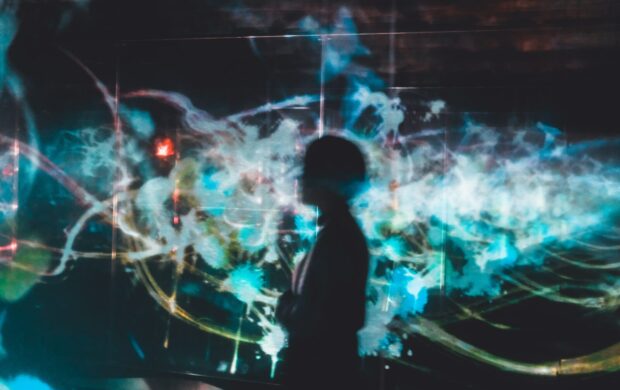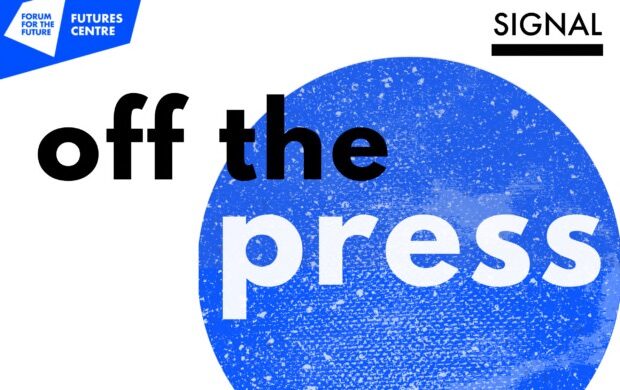Five futures thinkers share their insights on what’s slow, stuck or seemingly constant – and what we can do.
There’s so much talk about the accelerating pace of change. One contemporary philosopher, Hartmut Rosa, argues that the present moment is shrinking: our actions have shorter and shorter life-spans in terms of their relevance and validity. The rapidly changing context – with global crises spinning out of a nexus of trends as wide-ranging and fast-moving as tech innovation, climate change, biodiversity loss and political polarisation – means the implications of today’s actions run away from us, and we are left chasing after them.

Futurists work from within this whirlwind, looking around them at the storm and trying to make sense of it. Most of the time people ask us to talk about what changes we see emerging. But it’s not all change: ask anyone tracking progress towards the UN Global Goals!
I asked five thought leaders working in futures and foresight to share their opinions about what’s not going to change over the next ten years.
- Majd Assi, Founder of Forward Agency, UNDP Youth Futures Ambassador | Damascus
- Xue Bai (Snow), future-focused designer and co-author ‘Leading as if Life Matters’ | New York
- Abril Chimal, Technical Editor of the Journal of Futures Studies | Mexico City
- Aarathi Krishnan, Strategy & Foresight Advisor at UNDP | New York
- Jose Ramos, Director of Action Foresight | Melbourne
Their immediate responses to the question were interesting. It’s about time frames, said Xue Bai (Snow):
“Some things take a longer time to change, so if you are watching them they may seem to be standing still. And just because something doesn’t change in the immediate future, it doesn’t mean we shouldn’t invest in it now. Take education: you invest in it for a future beyond the next decade.”
Change happens at different levels too, said Aarathi Krishnan. “I expect we’ll still be talking about the same macro trends in 10-15 years: geopolitics, climate, the social impacts of tech, political polarisation. And yet the epidemic has demonstrated how quickly the world and all of us can come to a screeching halt. It has highlighted our capacity for change where we thought we couldn’t…”
Moreover, it points to something about the type of change caused by a global crisis, says Krishnan: that it can both cause things to stop (whole sectors, global travel, education and social lives) and to accelerate (from how and where we work to the development of vaccines) at the same time.
We need to find the right pace of change, depending on what we want to achieve. “Relying on the existing fast-growing economic model to achieve our long-term goals could distance our chances”, says Xue Bai. If we want to build long-term resilience after COVID, then rapid change back to a pre-pandemic notion of normality may be the worst course of action.
What’s not changing in the next 10 years?
Whatever trajectory we take, what is it that these thought leaders don’t see changing over the next ten years?
Deep cultural patterns
We underestimate how difficult it is for us to change the deep cultural patterns that drive our behaviours”, says Jose Ramos, and that this really comes down to what it means to be a species, to be human: “We are cultural beings. We generate artefacts, languages, practices. And these have arguably as strong an effect on how we behave as any natural instincts. We override primary survival mechanisms because of our social identities, what’s expected of us.”
At the moment, we’re seeing a surge in interest in creating new cultural patterns: “To be indigenous is almost on trend now”, says Abril Chimal, who is of Mexica descent. “Everyone’s talking about their traditions, but we’re still not accepted in the mainstream.”
Even with growing recognition that today’s cultural mores aren’t serving us, there are barriers to reviving ancient knowledge that could help us to live sustainably. For one, much of that know-how has been lost through centuries of cultural imperialism, resulting in a huge loss of linguistic and behavioural diversity: “We had ancient knowledge about how to maintain a sustainable village from pre-hispanic eras”, says Chimal. “That knowledge is almost lost. One community in Oaxaca State used to communicate across the vast forested landscape in whistles.” How can such a language be revived in a world of silent tweets?
It’s not just that we don’t pay enough attention to our ancestors, says Krishnan: “We look after this generation now, not future ones. We talk about change, but we are so caught up with our lives today, that something in the future is really hard to connect to.”
Beyond this failure of empathy for generations past and future, strong forces hold dominant cultures in place. “If we’re talking about changing our behaviours, then ten years is not a long time”, says Majd Assi, a young Syrian futurist and UNDP Youth Futures Ambassador. Our needs and capacities may change rapidly, but our institutions are slow to adapt. “Take the education system: we still have physical universities. Even though we can all work and learn online, it’s so hard to transform a place-based institution into a digital one.”
Structures and assets, like university campuses or power stations, can act as brakes on change – because they risk redundancy as our behaviours and expectations evolve. What else prevents cultural change?
“Cultural hegemony”, says Ramos – with a nod to Gramsci. Institutions are bound to those in power by ties of mutual interest. If cultural hegemony is to be challenged, institutions must take a stand. Sometimes they do: JP Morgan set aside $30 billion to address systemic racism in response to Black Lives Matter, tackling barriers to housing through initiatives such as offering lower mortgage payments to Black and Latinx households and expanding affordable housing in underserved communities. But how often do we see institutions take a stand for equity (or any major social shift) without the nudge of widespread protests?
Too great a focus on growth
For all five interviewees (and millions of global protestors) governance is where we urgently need change, and where it’s most intractable. Conflicts of interest are a major factor:
“Where we are really stuck is where we are with the corporate and moneyed influence on politics”, says Ramos. “In Australia, any substantive stand on climate change is hamstrung by the mineral lobby. They call themselves the Climate Mafia. Capitalism has absolutely no respect for what it means to be human. It doesn’t care about our deeper needs.”
The drive for growth distracts governments from what really matters, agrees Snow: human lives.
“We’re actually quite good at setting goals and going after them. When the goal is economic growth, we achieve it! We exhaust ourselves to earn higher salaries and achieve greater spending power. But we’re less open, less connected and behind on crucial global goals: nutrition and basic medical care; water and sanitation; personal rights and inclusiveness.”
Not only are governments enthralled to corporates, but they are too narrowly focused on national interest, says Chimal. “Governments are not willing to see the big picture. They are working to self-centered goals: vaccines for us, water for us. They aren’t able to think in terms of a broader linked system, an ecology.”
Disinformation is a powerful force behind this blinkered worldview. But that’s nothing new, says Chimal – it’s merely amplified by technology: “Today we have the Mexican president telling people not to worry about COVID, that a saint stamp will protect you. Back in 1985, when an earthquake killed at least 10,000 in Mexico City, the government only reported 3,692 deaths.”
For Assi and Ramos, the answer is to open up political space for a much greater level of civic engagement.
“If we want to drive change for the global good of all, then it’s critical that we put governance in the hands of people – not politicians,” says Assi.
And to do this, we have to move beyond the tokenism of democracies today, says Ramos: “You just turn up every three years to vote, that’s the limit of your responsibility: there’s no real nuance or involvement. There’s a lot of new thinking on deliberative democracy, brilliant ideas and experiments from Iceland to Taiwan, and yet we’re living in the age of oligarchs…”
Tech-shaped lives
The biggest question for global governance is what to do about tech, says Krishnan: “We’ll still be talking about this in a decade for sure.” It’s an area where the pace of technological change far outstrips thoughtful responses in policy or practice – bringing a critical need for foresight.

“It’s happening so fast, and the issues are so complex, that we’re merely firefighting, tackling the issues as they hit us,” Krishnan warns.
She points to the levels of noise it took for Climate Change to enter mainstream debate: “There were severe weather impacts. The world’s leading scientists lobbied. Big names got behind it. And it still took decades to become a common, acceptable thing to talk about. There’s a push around the ethics of tech, and yet it’s a relatively small group of people speaking about it, advocating for it, thinking about the implications of big data, the platforms we’re using, where mass automated systems could lead… Most people aren’t aware of the risks. We need to bring it into the public space.”
COVID-19 has accelerated some of the impacts, says Assi. “We see more dependency on tech, and fewer human interactions. There’s also a centralisation of control over personal data, through giant social platforms and even the hardware in our homes. This has ramifications for how we feel, how we behave, the choices we make – and it’s very appealing for governments to make use of it. Investors aren’t focused on how all this can serve the good of the people, but how it can control us.”
“What we really want is for tech innovation to be life-centred”
“What we really want is for tech innovation to be life-centred”, agrees Snow.
These concerns are grimly backlit by the news of Google firing two employees who were researching ethical approaches to artificial intelligence.
What can unlock change in the next 10 years?
So much for where we’re stuck. What did our futures thinkers have to say about where we can focus our energies to unlock important paths for change in the next decade?
Deeper connections
It’s not just tech innovation that needs to be life-centred, but the whole economy. Social justice is sorely lacking in the drive for circularity and sustainability, says Chimal: “It’s a circular economy, but not for everyone.” Models like Kate Raworth’s ‘Doughnut Economy’ emphasise social justice, but that’s not playing out in practice. “Companies are getting rich on trading waste in Mexico, India, the US – but waste collectors are paid very little.” The same goes for moves towards regeneration: “Those openings are gentrified, exclusive. Take vacations in places with renewable systems or reforestation: only people with certain means can be part of it.”
For Chimal, changing this means not just upcycling our waste, but upcycling our behaviours: we need to learn to bring back lost cultural practices and adapt them for today’s world. “For instance, we used to listen a lot to our surroundings. If you talk with agriculturalists across the world, or anyone who works with animals, they learn to listen. But among millennials, that’s lost. If we learn to listen again to our surroundings, we might change something – first in ourselves, then in our communities and globally.”
It’s also about expanding our notion of the present.
“We talk about mindfulness, but we need to consider what’s happened in the past and what’s going to happen in the future. We need to listen to past generations and future ones, as well as to each other today.”
For Krishnan, 2020 was a year that showed the power of care. “One of the things that I learned over the last year is that we can’t actually live insular lives. We need each other. For services. For touch. For connection. For intimacy. It’s been really hard being cut off. We may lack empathy for future generations, but we underestimate the abundance of care we can put into each other.” She draws hope from stories of how we adapted to be able to connect at critical times, such as priests in India using iPads to support funerals.
Is a digital window on our relatives and friends enough, though? Connecting in a meaningful way means being able to engage in real dialogue with each other, says Ramos. “Meta conflicts emerge when people stop listening to each other and start projecting. Platform capitalism [whereby tech giants such as Google, Facebook and Apple act as a foundation for other businesses to operate] has accelerated that polarism. People live in their ideological communities. We believe what’s convenient to believe.” Instead, we need to embrace the discomfort of contrasting ideas.
But will tech always be working against us in this? Xue Bai is optimistic that we can live in a conscious, deeply connected way, even alongside the powerful forces of AI: “One scientist, Kate Darling, talks about how she felt compelled to comfort a toy dinosaur that was programmed to cry when it was dangled by the tail. It shows how far our empathy can stretch.”
Assi draws us back to human connections. He wants to see this across borders, as well as generations – and action as a result. “Those of us who live in prosperous communities need to think how we can extend our sense of compassion and empathy to find meaningful ways to support people in Syria, in underdeveloped countries…”
Empowered mindsets
One conviction echoed through these conversations: that what changes and what doesn’t is largely a question of mindset. Motivated individuals and communities can and do create the change they want to see, even when the odds seem stacked against them.
Ramos is inspired by the Nobel Prize-winning voting rights activist Stacey Abrams, who served in the Georgia House of Representatives from 2007 to 2017. “She changed how voter registrations work to shift the balance of power. She changed the outcome of the state election. She opened up political space.” For Ramos, Abrams shows what can be achieved by working to drive institutional change from the inside.
Chimal takes inspiration from stories of communities empowering themselves. In Oaxaca State, one of the most biologically and linguistically diverse places in the Americas, indigenous leaders worked with hackers to build the world’s largest independent, community-owned cell phone network, connecting at least 63 communities and providing services to 3,500 people in spite of challenges such as mountains, dense forests and low or no infrastructure.
We don’t have to go for world records or Nobel prizes to drive significant change, says Snow. She sees the power of the daily choices we make, such as young talents refusing to work for companies that don’t connect them with meaning and purpose. “We don’t have to tolerate businesses that fail to offer good social outcomes”, she says.
Small steps are also crucial if we want to take action on climate change without getting overwhelmed, she adds, holding up the ‘five steps’ from the documentary Our Planet as a clear way forward.
“We can all think about what we eat, how we shop, what we buy. Even if we don’t see the immediate benefits, that’s the path, and we need to educate ourselves and our children in all languages and through the stories we tell, so that everyone can make these choices.”
We are, all of us, shaping the next decade – whether we like it or not. Are we mindful enough of the stories we’re telling, the paths we’re choosing?
Read next from Anna Simpson:
Funding a more equal future
Empowering families post-COVID
Reading the waves: who’s making sense of narrative change?



















Join discussion